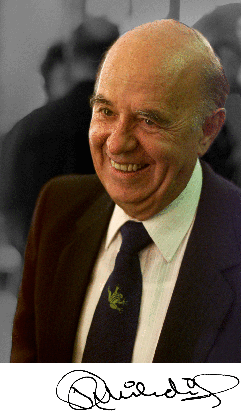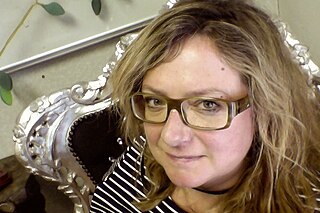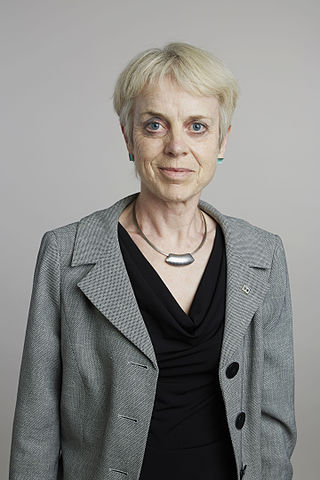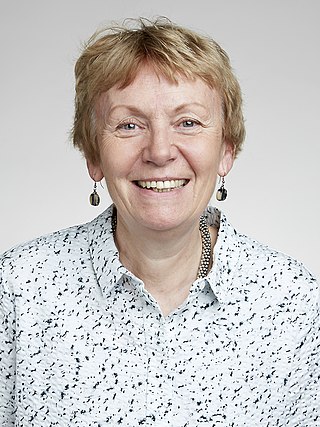Angela Vincent is Emeritus professor at the University of Oxford and a Fellow of Somerville College, Oxford.

Geoffrey Burnstock was a neurobiologist and President of the Autonomic Neuroscience Centre of the UCL Medical School. He is best known for coining the term purinergic signalling, which he discovered in the 1970s. He retired in October 2017 at the age of 88.
Gillian Patricia Bates FMedSci FRS is a British biologist. She is distinguished for her research into the molecular basis of Huntington's disease and in 1998 was awarded the GlaxoSmithKline Prize as a co-discoverer of the cause of this disease. As of 2016, she is Professor of Neurogenetics at UCL Institute of Neurology and the co-director of UCL Huntington's Disease Centre.

Ricardo Miledi was a Mexican neuroscientist known for his work deciphering the role of calcium in neurotransmitter release. He also helped to develop a technique for studying native receptors in frog oocytes for drug development.
William Anthony Harris FRS FMedSci is a Canadian-born neuroscientist, Professor of Anatomy at Cambridge University, and fellow of Clare College, Cambridge. He was head of the Department of Physiology, Development and Neuroscience since its formation in 2006 until his retirement in 2018.

Jonathan Felix Ashmore is a British physicist and Bernard Katz Professor of Biophysics at University College London.
Graham Leon Collingridge is a British neuroscientist and professor at the University of Toronto and at the University of Bristol. He is also a senior investigator at the Lunenfeld-Tanenbaum Research Institute, Mount Sinai Hospital in Toronto.

Claudio Daniel Stern FRSB, FMedSci, FRS is a Uruguayan biologist currently working at University College London (UCL).

Sophie Kerttu Scott is a British neuroscientist and Wellcome Trust Senior Fellow at University College London (UCL). Her research investigates the cognitive neuroscience of voices, speech and laughter particularly speech perception, speech production, vocal emotions and human communication. She also serves as director of UCL's Institute of Cognitive Neuroscience.

Michael A. Häusser FRS FMedSci is professor of Neuroscience, based in the Wolfson Institute for Biomedical Research at University College London (UCL).

Annette Catherine Dolphin is a Professor of Pharmacology in the Department of Neuroscience, Physiology and Pharmacology at University College London (UCL).

Maria Fitzgerald is a professor in the Department of Neuroscience at University College London.

David Lodge is a research fellow in the Department of Physiology and Pharmacology at the University of Bristol.

Dimitri Michael Kullmann is a professor of neurology at the UCL Institute of Neurology, University College London (UCL), and leads the synaptopathies initiative funded by the Wellcome Trust. Kullmann is a member of the Queen Square Institute of Neurology Department of Clinical and Experimental Epilepsy and a consultant neurologist at the National Hospital for Neurology and Neurosurgery.
The Department of Pharmacology at the University College London, the first of its kind in England, was founded in 1905 and remained in existence until 2007.

(Edith) Yvonne JonesFLSW is director of the Cancer Research UK Receptor Structure Research Group at the University of Oxford and a Fellow of Jesus College, Oxford. She is widely known for her research on the molecular biology of cell surface receptors and signalling complexes.

Neil Burgess is a British neuroscientist. He has been a professor of cognitive neuroscience at University College London since 2004 and a Wellcome Trust Principal Research Fellow since 2011. He has made important contributions to understanding memory and spatial cognition by developing computational models relating behaviour to activity in biological neural networks.

Mark Lee Mayer is scientist emeritus at the National Institutes of Health (NIH). His research investigates glutamate receptor ion channels, the major mediators of excitatory synapses in the brain. He has made numerous observations that have changed our view of receptor function and neurotransmission in the brain. Major findings include discovery of the block of NMDA receptors by extracellular Mg and their high Ca permeability; analysis of the permeation and block of Ca permeable AMPA and kainate receptors by cytoplasmic polyamines; and structural studies on ligand binding, allosteric modulation, and gating using X-ray diffraction and cryoelectron microscopy.
Charles Kenvyn ffrench-Constant FRCP FMedSci FRSE is a neurology researcher, specialising in multiple sclerosis. He has been recognised for his "fundamental and sustained contributions that underpin much contemporary research in developmental and regenerative neuroscience".
Arthur Henry Weston is emeritus professor at the University of Manchester, where he was previously Leech Professor of Pharmacology from 1989-2011.













